Omega-3 fatty acids are important nutrients for most dogs. They are known mostly for being effective anti-inflammatory agents, but these fats are also important in many other processes such as growth and development of the brain, the circulatory system, and the skin. Many veterinarians prescribe omega 3 supplements for dogs. B
In the canine world, omega-3 supplements support joint health, contribute to a beautiful coat, and enhance memory in elderly dogs. Due to the incapability of dogs to naturally synthesise such acid fats, they are required to rely on food or supplements to consume the fatty acids.
Does your dog need omega 3 supplements? Let’s find out!
Omega 3 Supplements for Dogs: EPA and DHA
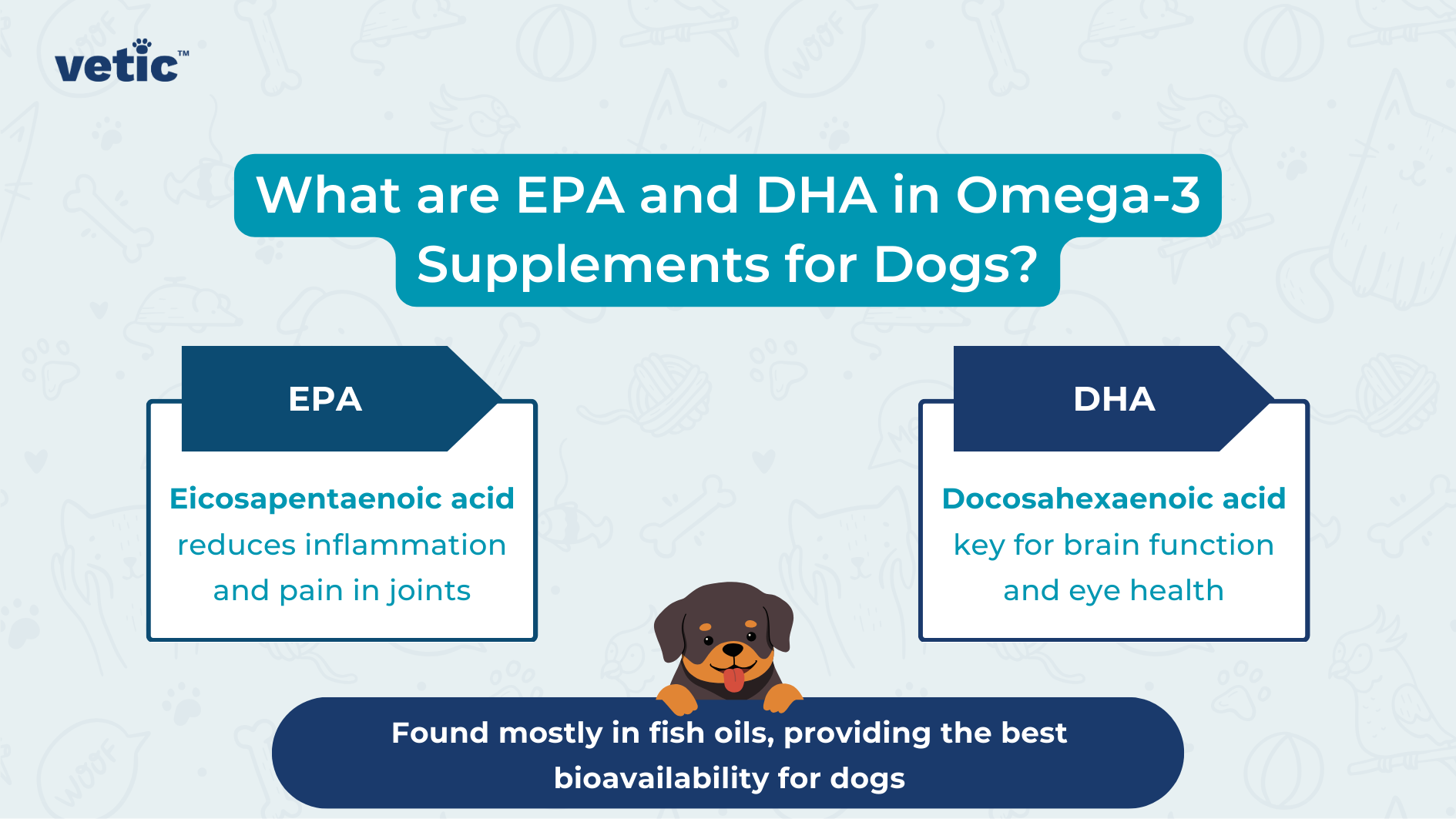
Polyunsaturated fats of omega-3 fatty acids are essential in several dog health-related processes. The two forms that are most beneficial to dogs are EPA (eicosapentaenoic) and DHA (docosahexaenoic). These two essential fatty acids are mainly derived from fish oils that contain a high proportion of both EPA and DHA, which are also bioavailable in dogs.
In general, by including omega-3s from fish oil or fish oil alternatives pet parents can achieve a host of health benefits such as the alleviation of pains, inflammation, or improvement of brain activities.
Effects of Omega 3 Supplements on Dogs’ Health
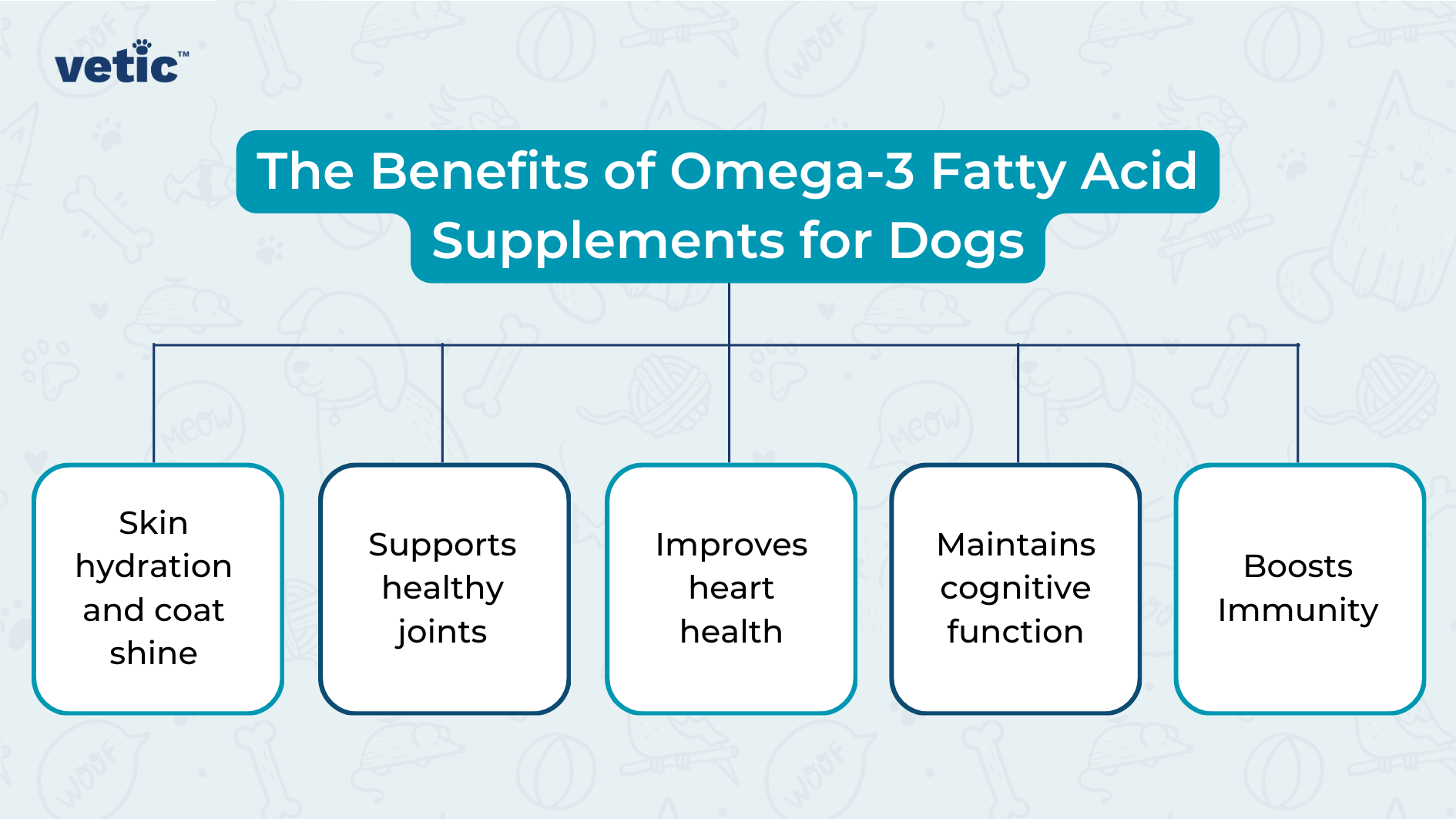
1. Skin and Coat
Omega 3 fatty acids help in improving skin and fur quality by alleviating conditions like dryness and itching. Additionally, they may limit excessive fur loss and aid dogs with itchy skin allergies or dermatitis by keeping their skin hydrated and easing the swelling.
2. Joint and Bones
Most veterinarians will prescribe omega-3 supplements for arthritis in dogs or any other condition that affects its ability to move. The roles of EPA and DHA are to help with the inflammatory process and decrease pain in the affected joints.
This benefit is extremely useful for senior dogs of both large and small breeds, who are often active but have degenerative joints.
3. Heart and Circulatory System
Omega 3 is essential for the heart as it helps reduce LDL (low-density lipoprotein), triglycerides and maintains normal heart rhythm and blood pressure. Omega 3 fatty acids also enhance blood flow which is advantageous to dogs that are prone to heart diseases.
4. Cognitive and Brain Functions
Omega 3 fatty acids are known to be supportive of cognitive health and are critical for ageing dog’s cognitive function. DHA is one of the most important components for normal brain functions, such as memory, problem analysis, decision making and other cognitive functions.
It is also very useful for young dogs with developing brains, in enhancing learning processes and mental acuity.
5. Immune System Support
Since the primary role of omega 3 fatty acids is to reduce inflammation, they are helpful especially in improving the immune function in dogs suffering from autoimmune conditions or chronic inflammatory conditions.
Proper immune function can protect them from pathogens. Omega 3 supplements for dogs enhance their overall immune function in general.
6. Healthy Eyes
In particular, DHA improves eye function and helps prevent the development of age-related eye diseases in dogs.
Developmentally, mother dogs need this nutrient during gestation for the proper development of their pups’ eyesight, but even adult dogs can benefit from a proper DHA level, as it aids their eyesight.
What Are Some Natural Sources of Omega 3 Fatty Acids in India?
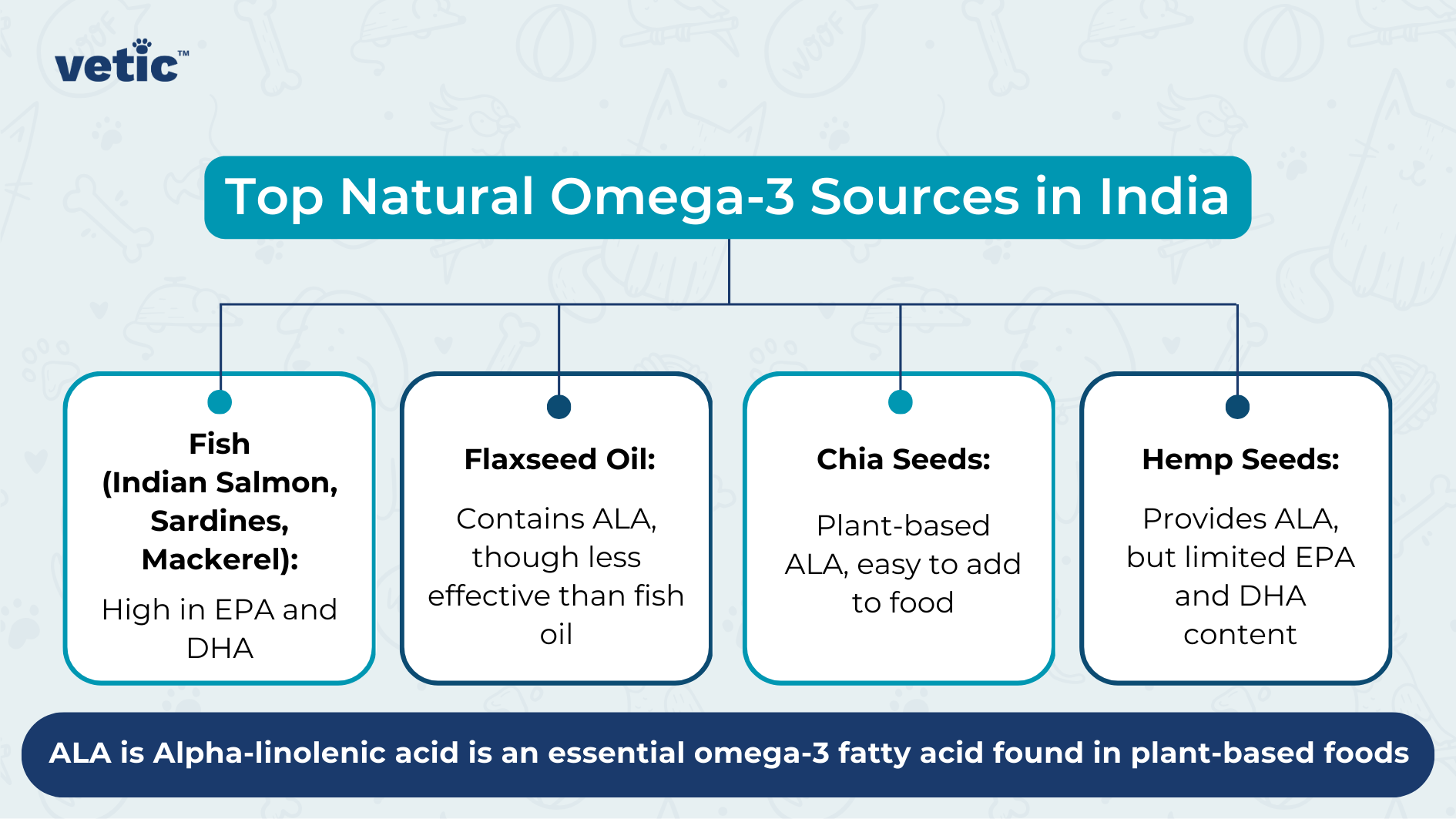
The following are a few naturally occurring sources of omega 3 that are found in india which are easy to access by dogs:
- Fish (Indian Salmon, Sardines, Mackerel): These fish have a high content of EPA and DHA which are the most bioavailable ones for dogs in their natural form.
- Flaxseed Oil: It has ALA (alpha-linolenic acid) – which is useful but not very effective as compared to marine sources for dogs.
- Chia Seeds: These seeds also contain ALA in good amounts and they can be easily added to the dog’s food (with due advice from a veterinarian) for that extra nutrition.
- Hemp Seeds: Another plant based source, hemp seeds can provide omega-3, although they are lower in EPA and DHA than the fish based ones.
If you want to include natural sources of omega-3 fatty acids in your dog’s diet, you should consider the possibility of allergies and intolerances. Speak to your veterinarian before changing your dog’s diet.
Why Natural Sources of Omega 3 Aren’t Enough for Most Dogs
Although your dogs may be consuming multiple of these natural sources of omega 3 fatty acids, such sources are not adequate and fail to meet the recommended daily allowance (RDA) for dogs. Dogs who have inflammatory conditions require more than the RDA of healthier dogs and they require omega-3 supplementation.
Use of dietary omega 3 fatty acids due to its therapeutic properties requires large quantities which can be hard to achieve with food alone. Moreover, ALA is not effectively converted to EPA and DHA for dogs.
As a result, omega 3 fatty acids are often recommended in the form of supplements, especially in dogs who have certain health problems such as arthritis, autoimmune disorders, dermatitis and heart conditions.
Which Age and Breed of Dogs Need Omega 3 Supplements?
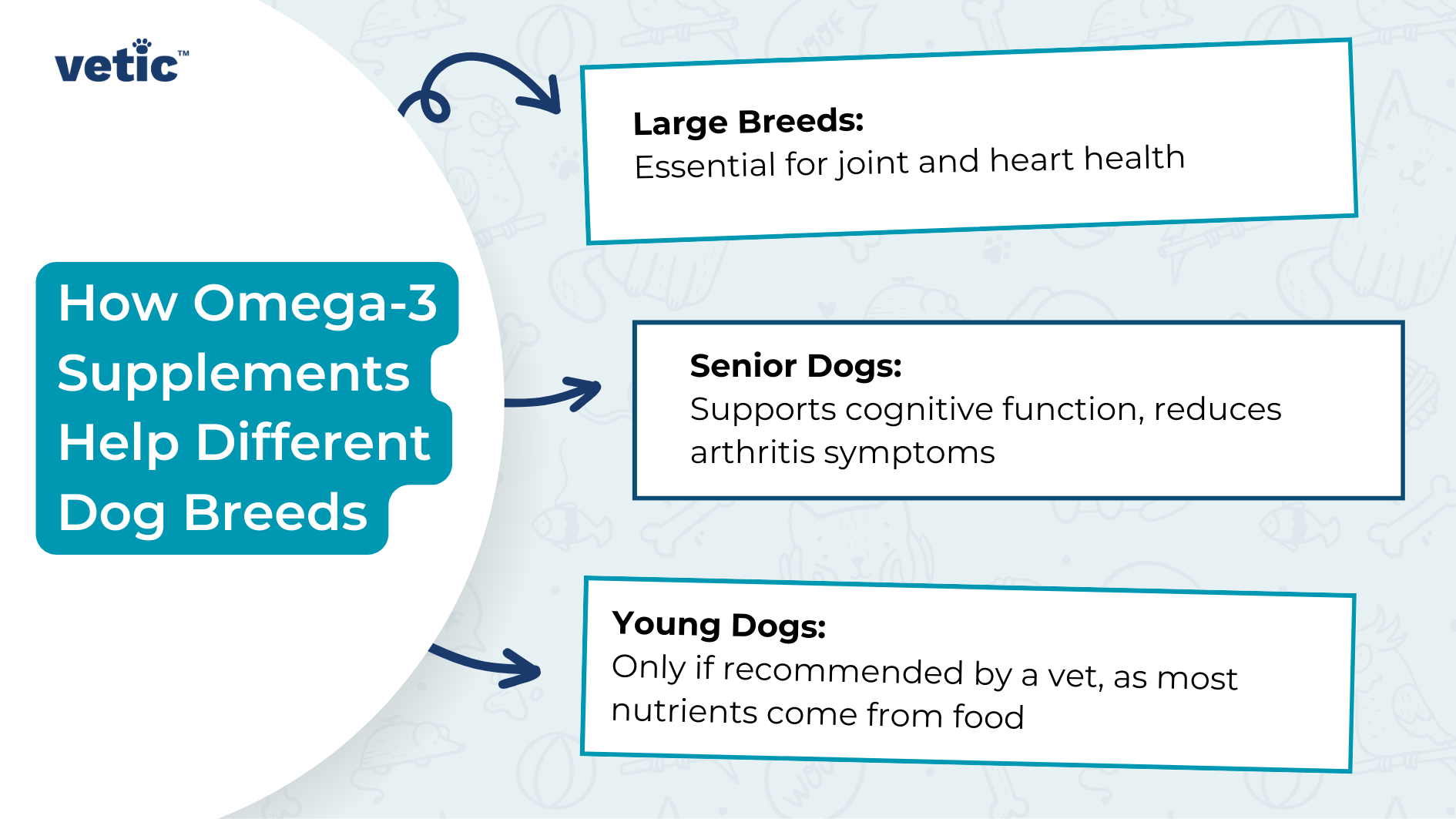
Omega 3 supplements are common for large breeds who are susceptible to the development of complications in the joints (such as Labradors, Golden Retrievers, German Shepherds) and for ageing dogs with progressive signs of arthritis or other old-age diseases such as cognitive disorders.
Nevertheless, puppies or grown-up dogs, as a rule, are not prescribed and do not need omega-3 fish oils unless recommended by a veterinarian.
Do All Dogs Need Omega 3 Fatty Acid?
Although omega 3 fatty acids have a positive effect on dogs, not all of them have a need for it as a dietary supplementation. A healthy dog fed a complete and balanced diet may already enjoy some omega-3 through its diet especially if the dog eats high-quality dog food that contains these fatty acids.
On the other hand, dogs suffering from arthritis, skin allergies, or auto-immune diseases are advised to take more omega 3. It is also important to see a veterinarian if your dog has health complications discussed above.
Forms of Omega 3 Supplements Available for Dogs in India
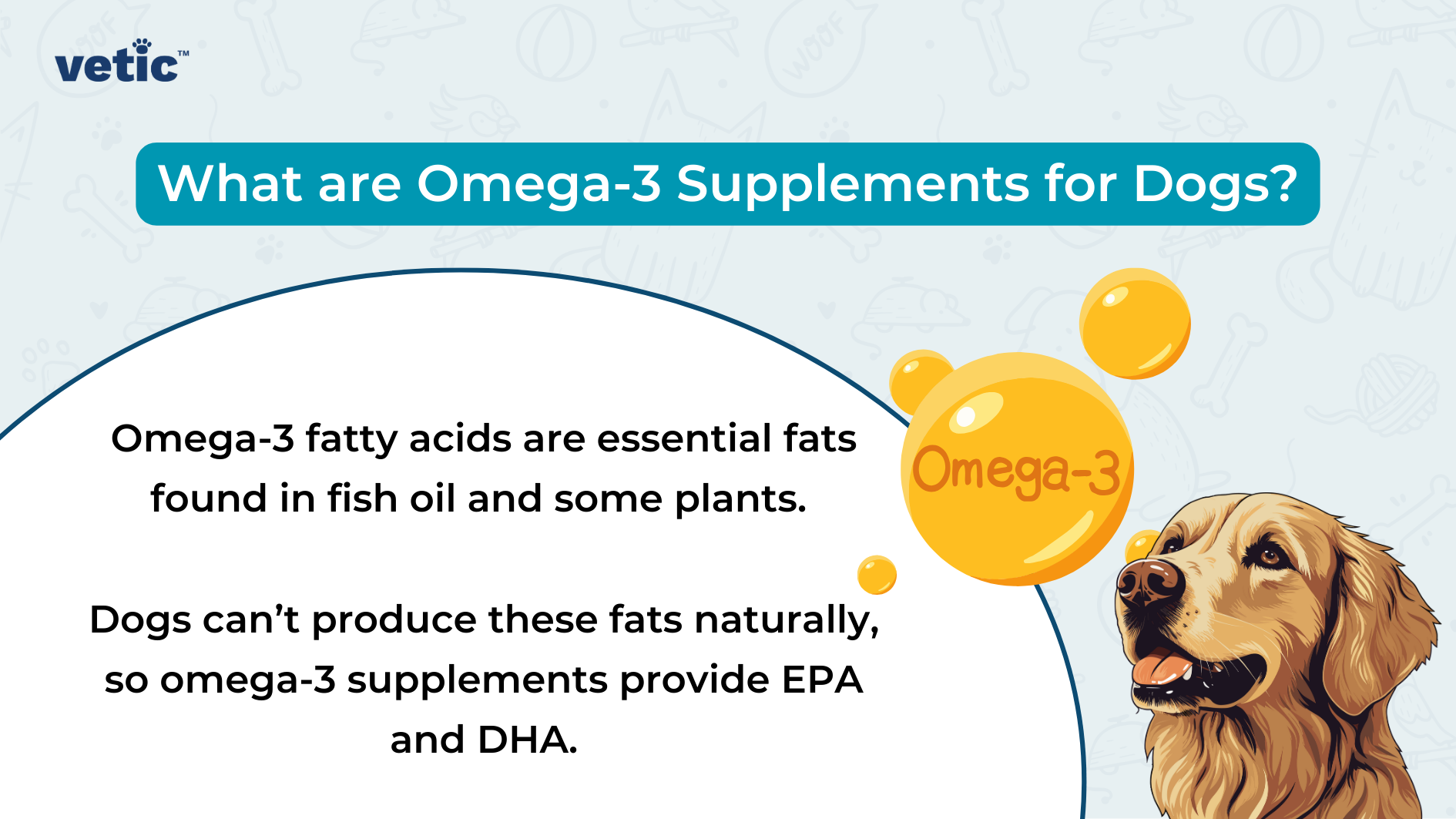
In India, pet parents can find omega 3 supplements for dogs in various forms:
- Fish Oil Capsules and Liquids: These are popular and offer concentrated EPA and DHA.
- Krill Oil Capsules: Known for their high potency and antioxidant benefits, krill oil requires smaller doses.
- Flaxseed Oil: A plant-based option providing ALA, though it is less effective for dogs than fish-derived sources.
Tips for Selecting the Right Omega 3 Supplement for Your Dog
When trying to choose an omega 3 supplements for dogs, only consider products that are certified safe and pure and indicate the level and source of EPA and DHA.
Avoid supplements that contain additional vitamins and minerals apart from the necessary EPA and DHA unless your veterinarian recommends them for specific health concerns. Avoid vitamins that are contaminated with heavy metals and other toxins since those toxins may be found in many fish oils.
Product reviews and the recommendations of veterinarians can also help direct you to safe products for your dog’s condition and health requirements.
Discuss with the veterinarian the dosage and formulation that your dog requires.
What Are The Side Effects of Omega 3 Supplements for Dogs?
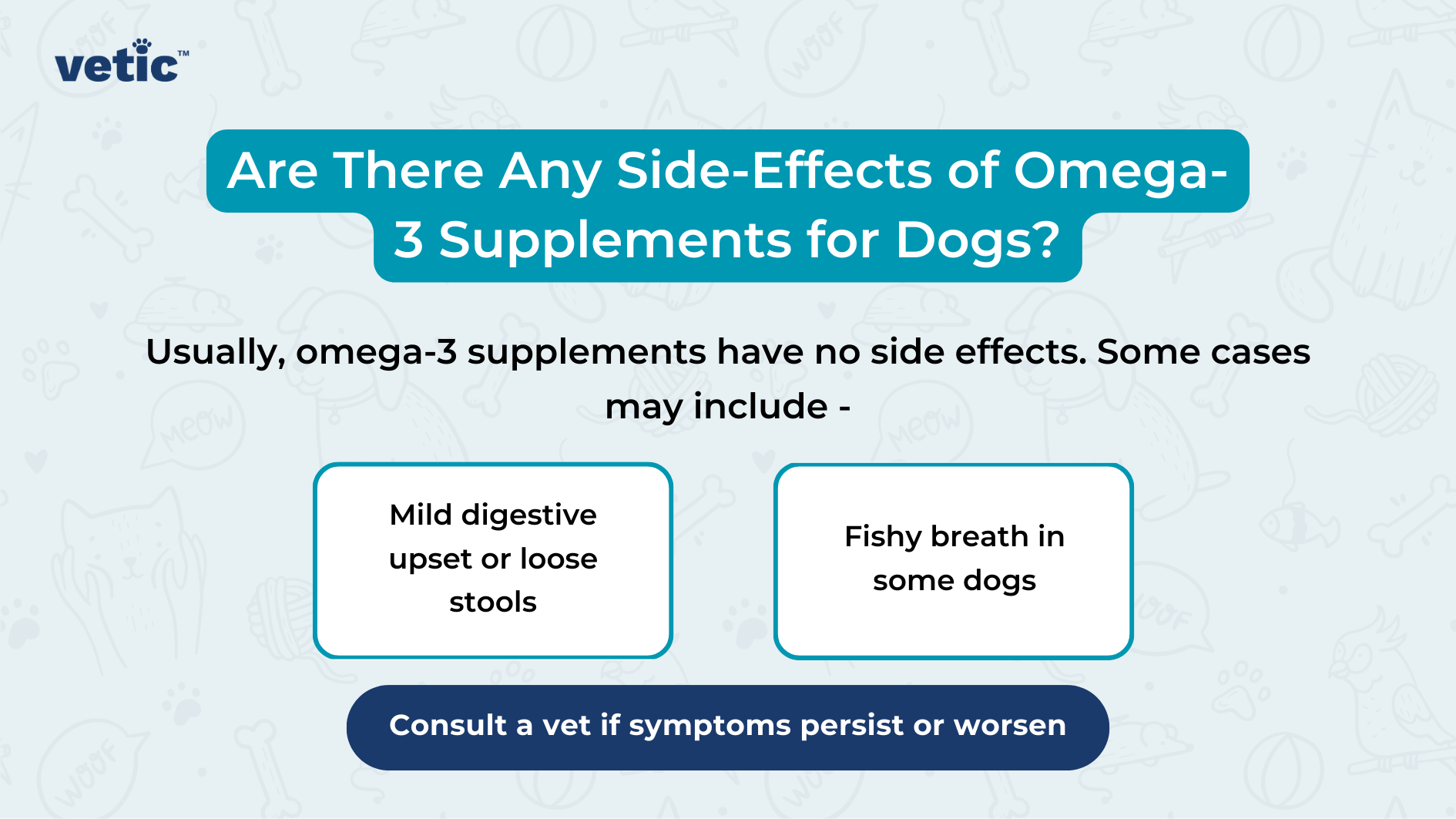
Though omega 3 supplements for dogs are generally safe, they can occasionally cause mild digestive upset, loose stools, or fishy breath in dogs.
Higher doses may increase bleeding risk, especially for dogs with clotting disorders or on certain medications.
Monitoring and gradually introducing the supplement can help minimise these effects. If any adverse symptoms appear, consult your veterinarian for guidance.
Should You Get Omega 3 Supplements for Your Dog?
Omega 3 fatty acids are an essential dietary component for dogs suffering from certain ailments, thus aiding in the enhancement of their skin, joints, and brain functions. Nonetheless, these supplements may not be required for fit adolescent puppies and junior dogs provided that they are on wholesome diets.
There is always a need to seek a veterinarian’s opinion before giving any supplements to a dog since they will know what dose and type are suitable for that particular dog, and the purpose for giving that supplement will not be inconsistent with the dog’s health.
FAQs About Omega 3 Supplements for Dogs
Can I give my dog human omega 3 supplements?
No, human omega-3 supplements may contain additives harmful to dogs. Always use pet-specific omega-3 products.
How long does it take to see results from omega 3 in dogs?
Results, like improved coat or mobility, typically appear after 4-6 weeks of consistent use.
Can omega 3 supplements help with my dog’s joint pain?
Yes, omega-3s reduce inflammation and may alleviate joint pain in arthritic dogs, improving their mobility.
Is omega 3 supplement safe for puppies?
Consult a veterinarian; puppies often receive adequate omega-3 from high-quality food without additional supplements.
Does omega 3 supplement cause any side effects in dogs?
Some dogs experience mild side effects like loose stools or fishy breath; consult your vet if symptoms persist.
How much omega 3 should I give my dog daily?
Dosage depends on size, health needs, and supplement concentration; follow your veterinarian’s specific guidance.
Are plant-based omega 3 sources like flaxseed good for dogs?
Plant-based sources contain ALA, less effective for dogs; EPA and DHA from fish oil are more beneficial.

